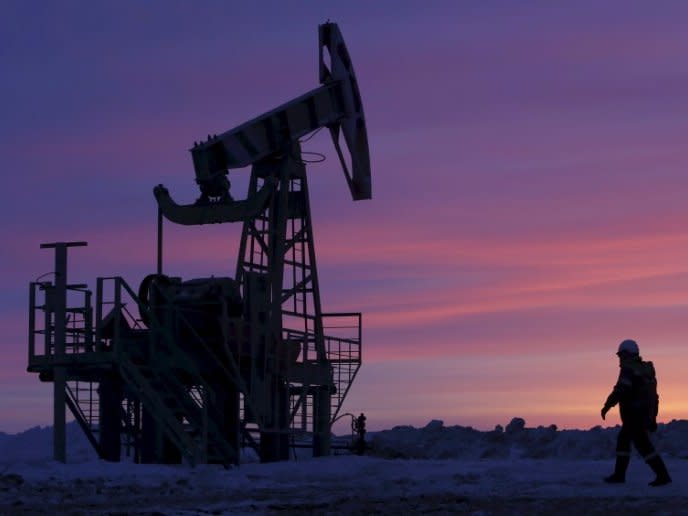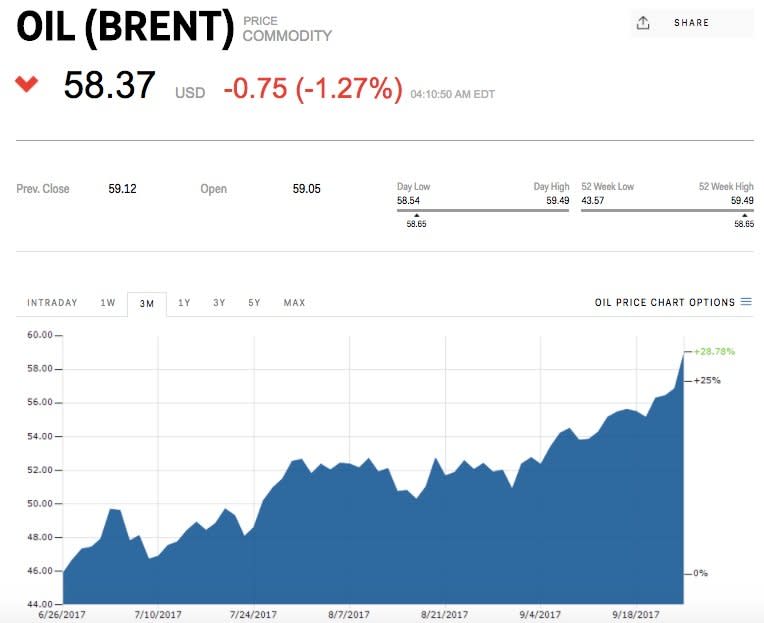Oil prices hit 2-year high as Turkey threatens to cut off Iraq's exports

Thomson Reuters
LONDON — Oil prices jumped to their highest point in more than two years late on Monday and remain close to those levels in early trade on Tuesday.
The rise is down to international tensions between Turkey and Iraq, and increased demand from Asia.
Brent reached a high-point of $59.02 per barrel on Monday evening, its highest since July 2015, while US West Texas benchmark hit $52.22 per barrel.
Mike van Dulken, an analyst at Accendo Markets, says in an email on Tuesday morning: "Brent Crude traded a 27-month high overnight as the Kurdish referendum stokes supply concerns, while strong demand from China also aids sentiment."
On Monday, Turkey's President Recep Tayyip Erdogan threatened to disrupt oil flows from Iraq's Kurdistan region, in an attempt to pressure the area over its independence referendum, which he opposes. Erdogan said he could cut off the pipeline that carries hundreds of thousands of barrels of oil per day out of Iraq.
Hussein Sayed, Chief Market Strategist at FXTM, says in an email on Tuesday morning: "The Kurdistan region of Iraq currently produces around 650,000 barrels per day, of which 85% goes through the Turkish pipelines. If the Turks decided to cut crude flows, it would create a shock which markets are currently pricing in.
"However, I think this is going to be only a temporary threat, given that independence will not happen overnight and OPEC members will quickly cover the shortage. In my opinion, the spread between Brent and WTI has gone too far and should shrink back towards $4-5."
Brent is indeed retreating slightly on Tuesday morning but is still close to those two-year highs. Here's how Brent looks at 9.10 a.m. BST (4.10 a.m. ET):

Markets Insider
As well as the Turkey-Iraq spat, growing demand from China and longer-term production cuts aimed at curbing the supply glut are also supporting oil's price rises.
OPEC countries, which include oil giants Saudi Arabia and the United Arab Emirates, have cut production by about 517,000 barrels a day since the beginning of the year, while other oil-producing nations like Russia have also made cuts. Since June, the price of Brent has risen by almost a third.
Although oil prices have been volatile over the past several years, BP's top oil trader in Asia, Janet Kong, told a Financial Times conference the market was now "at a juncture."
See Also:
SEE ALSO: REPORT: Saudi Arabia may raise petrol prices by 80% this year — to just under 30p per litre

 Yahoo Finance
Yahoo Finance 
